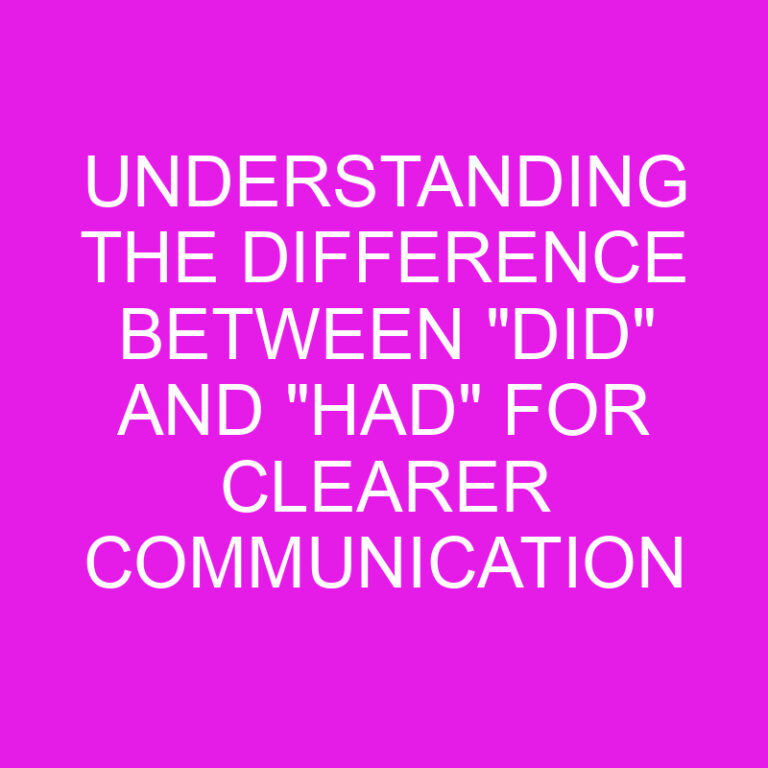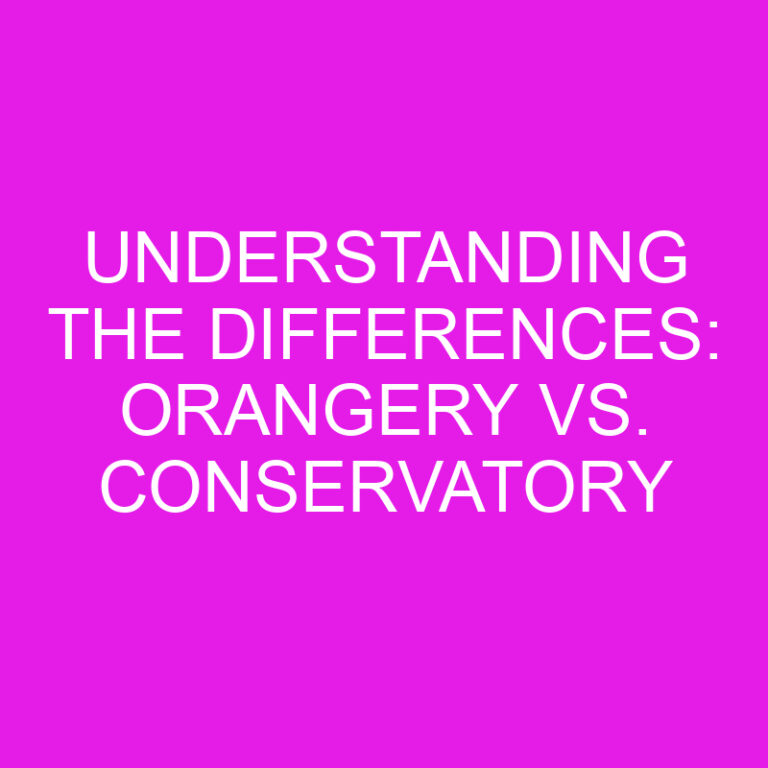
When it comes to English grammar, there are often subtle nuances that can trip up even the most seasoned writers. One such pair of words that often causes confusion is “shall” and “should.” While they may seem similar at first glance, these two words actually have distinct meanings and uses. In this article, I’ll break down the key differences between “shall” and “should,” helping you use them correctly in your writing. So, let’s dive in and unravel the mystery behind these two commonly misunderstood words.
Post Contents
Key Takeaways
- “Shall” is a modal verb primarily used for future actions or obligations, while “should” implies advice or suggestion.
- “Shall” is typically used with first person singular and plural pronouns, while “should” can be used with all persons.
- “Shall” can indicate strong recommendations or intentions, while “should” expresses expectations or likely outcomes.
- “Shall” is commonly used in legal or formal contexts to create obligations or restrictions, while “should” is used to offer recommendations or give advice.
- Understanding the nuances between “shall” and “should” is important for clear and effective communication, as “shall” conveys obligation and “should” implies a recommendation.
- When using “shall,” follow grammar rules such as expressing future actions, forming questions, indicating obligations and requirements, and considering British English usage.
- “Should” is commonly used for giving advice or suggestions, expressing expectations or probability, indicating obligations or responsibilities, and using it in conditional statements.
- “Should” is not as strong as “must” or “have to” and implies a suggestion or recommendation.
- Understanding the common uses of “should” is essential for clear and effective communication in everyday conversations, professional settings, and written correspondence.
Meaning of “Shall” and “Should”
When it comes to understanding the difference between “shall” and “should,” it’s important to recognize that these words have distinct meanings and uses in English grammar. Let’s dive into the meaning of each word to gain a clearer understanding.
“Shall”
The word “shall” is a modal verb that typically expresses future actions or obligations. It implies a sense of duty, requirement, or determination. Here are a few key points to keep in mind about the usage of “shall”:
- It is primarily used with the first person singular and plural pronouns, such as “I” and “we.” For example, “I shall attend the meeting tomorrow.”
- It is used to indicate a strong recommendation or intention. For instance, “You shall follow the rules.”
- In legal or formal contexts, “shall” is often used to create obligations or restrictions. For example, “The tenant shall pay the rent on time.”
“Should”
On the other hand, “should” is also a modal verb, but it has a different connotation and usage. It implies advice, suggestion, or probability. Here’s what you need to know about the usage of “should”:
- It is used with all persons, including the first, second, and third person. For instance, “I should exercise regularly.”
- It is commonly used to offer recommendations or give advice. For example, “You should take a break and relax.”
- “Should” can also express expectations or a likely outcome. For instance, “The project should be completed by next week.”
Understanding the nuances between “shall” and “should” is essential for clear and effective communication. Remember that “shall” conveys obligation, while “should” implies recommendation.
Grammar Rules for “Shall”
When it comes to English grammar, the word “shall” is often misunderstood or misused. Understanding the proper usage of “shall” is essential for effective communication. Here are some key grammar rules for using “shall”:
- Expressing future actions: One of the main uses of “shall” is to express future actions or events. It is commonly used when making promises, offers, or suggestions. For example:
- “I shall be there at 8 o’clock.”
- “Shall we go for a walk?”
- Forming questions: When forming questions in the first person (i.e., “I” or “we”), “shall” is used to ask for advice or suggestions. For example:
- “Shall I bring my laptop to the meeting?”
- “Where shall we go for dinner tonight?”
- Obligations and requirements: “Shall” is also used to express obligations, requirements, or rules. It is typically found in legal and official documents. For example:
- “All employees shall attend the safety training.”
- “Students shall submit their assignments by the deadline.”
- British English usage: In British English, “shall” is commonly used to express simple future actions, especially in formal contexts. For example:
- “I shall make the necessary arrangements.”
- “Shall I book a table for dinner?”
Remember that the usage of “shall” is less common in modern everyday English, particularly in American English. In most cases, “should” or other alternative words are used instead. Nevertheless, it is important to understand the nuances of “shall” to communicate effectively and accurately, especially in formal or legal contexts.
By following these grammar rules, you can ensure that your usage of “shall” is correct and enhances your communication skills.
Common Uses of “Shall”
Shall is a versatile word in English that can be used in a variety of ways. In this section, I will discuss some of the common uses of “shall” to help you understand its nuances better.
- Expressing Future Actions: One of the main uses of “shall” is to indicate future actions or events. For example, “I shall meet you at the office tomorrow” implies a planned meeting in the future. While “will” is more common in everyday conversation, “shall” is still widely used in formal or legal contexts.
- Forming Questions: “Shall” is often used to form questions, especially when offering suggestions or seeking advice. For instance, “Shall we go to the movies tonight?” or “Shall I bring anything to the party?” In these cases, “shall” conveys a sense of politeness and willingness to consider others’ opinions.
- Expressing Obligations and Requirements: Another important use of “shall” is to express obligations or requirements. For example, in legal documents or contracts, “shall” is often used to outline specific duties or conditions. It adds a sense of authority and clarity to the statement. For instance, “Employees shall arrive at work on time” or “All participants shall comply with the rules and regulations.”
- Making Offers or Promises: “Shall” can also be used to make offers or extend invitations. For example, “I shall lend you my car for the weekend” or “Shall I help you with your luggage?” In these cases, “shall” conveys a sense of willingness and generosity.
It’s important to note that the usage of “shall” can vary between American English and British English. While it is less common in modern everyday English, “shall” is still widely used in formal or legal contexts in British English.
Grammar Rules for “Should”
When it comes to the usage of “should” in English grammar, there are a few important rules to keep in mind. Understanding these rules will help you use “should” correctly and effectively in your communication. Here are the key grammar rules for “should”:
- Advice and Suggestions: “Should” is commonly used to give advice or make suggestions. It implies that something is recommended or advisable. For example:
- You should eat a balanced diet for good health.
- I think you should apologize for your behavior.
- Expectations and Probability: “Should” can also express expectations or probability. It denotes the likelihood of something happening. For example:
- He should arrive at the office by 9 AM.
- The package should be delivered tomorrow.
- Obligations and Responsibilities: “Should” is used to indicate obligations or responsibilities. It suggests that something is expected or required. For example:
- Employees should report any problems to their supervisors.
- We should respect the opinions of others.
- Conditional Statements: “Should” is used in conditional statements to express the consequence of a certain condition. For example:
- If you study hard, you should pass the exam.
- Should he not reply within a week, we will consider other options.
It’s important to remember that “should” is not as strong as “must” or “have to.” It implies a suggestion or recommendation rather than a requirement. By mastering these grammar rules for “should,” you’ll be able to communicate your ideas and expectations clearly and effectively.
Now that we’ve covered the grammar rules for “should,” let’s move on to exploring more about the usage of “shall” in the next section.
Common Uses of “Should”
When it comes to English grammar, the word “should” is commonly used in various contexts. Let’s explore some of its common uses:
- Giving advice or suggestions: One of the main uses of “should” is to provide advice or suggestions to others. For example, “You should eat more vegetables for a healthy diet.”
- Expressing expectations or probability: “Should” can be used to indicate what is expected or likely to happen. For instance, “The bus should arrive in a few minutes.”
- Indicating obligations or responsibilities: By using “should,” we can also convey a sense of obligation or responsibility. For instance, “You should always be punctual for meetings.”
- Using it in conditional statements: “Should” is commonly used to express a condition or requirement. For example, “If you want to pass the exam, you should study hard.”
Remember that “should” implies a suggestion or recommendation rather than a requirement. It is a more polite and softer way of expressing ideas compared to stronger terms like “must” or “have to.” Used correctly, “should” can help us communicate our thoughts effectively and politely.
Understanding the common uses of “should” is essential for clear and effective communication in everyday conversations, professional settings, and written correspondence. By mastering its usage, we can ensure that our intended meaning is conveyed accurately and appropriately.
Conclusion
Understanding the differences between “shall” and “should” is crucial for clear and effective communication in English. While “shall” is primarily used to express future actions or obligations, “should” implies advice or suggestion.
In formal contexts, particularly in British English, “shall” is commonly used to express simple future actions. However, its usage in everyday English has become less common. Nevertheless, it is still important to grasp its nuances, especially in formal or legal settings.
On the other hand, “should” is a more polite and softer way of expressing ideas compared to stronger terms like “must” or “have to.” It is often used to give advice or suggestions, express expectations or probability, indicate obligations or responsibilities, and in conditional statements.
By understanding the common uses of “should,” individuals can enhance their communication skills in everyday conversations, professional settings, and written correspondence.
Mastering the distinctions between “shall” and “should” allows for precise and effective communication, enabling individuals to convey their intentions and ideas accurately.
Frequently Asked Questions
Q: What is the difference between “shall” and “should” in English grammar?
A: “Shall” is primarily used to express future actions or obligations, while “should” implies advice or suggestion.
Q: What are the grammar rules for using “shall”?
A: The grammar rules for using “shall” include expressing future actions, forming questions, expressing obligations and requirements, and making offers or promises.
Q: Is “shall” commonly used in modern everyday English?
A: No, “shall” is less common in modern everyday English, but it is still important to understand its nuances, especially in formal or legal contexts.
Q: What are the common uses of “should”?
A: The common uses of “should” include giving advice or suggestions, expressing expectations or probability, indicating obligations or responsibilities, and using it in conditional statements.
Q: Is “should” stronger than terms like “must” or “have to”?
A: No, “should” is a more polite and softer way of expressing ideas compared to stronger terms like “must” or “have to”.






